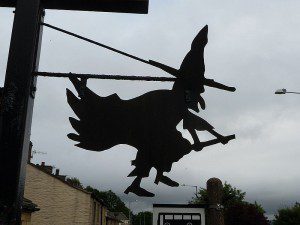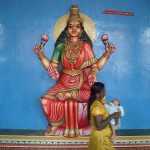 A few weeks ago the good folks over at Witchvox posted an article on their Facebook page from the UK Independent entitled “Police to be given specialist training to help child victims of ‘witchcraft’ beliefs.” Later in the day, the Covenant of the Goddess posted the article on their page as well. The reader reactions to the headline were swift, and many were sadly predictable:
A few weeks ago the good folks over at Witchvox posted an article on their Facebook page from the UK Independent entitled “Police to be given specialist training to help child victims of ‘witchcraft’ beliefs.” Later in the day, the Covenant of the Goddess posted the article on their page as well. The reader reactions to the headline were swift, and many were sadly predictable:
WTF??…whats next? Witch trials? We need to Band together. it’s all really starting to spread like a plague now….They have no excuse accusing anyone of anything…But child abuse is no practise in witchcraft. I love children, animals and the nature…Those who claim that harm children are posers! they are not us!…why are we being lumped in with people who perform genital mutilation?!?…What these police officers need is proper training on what WITCHCRAFT really is and when people use it as a term to scapegoat themselves with a “religion” so that they can perform heinous acts!…Persecution by the Christians all over again, they are the worst on their children! Look at the catholic priest!
What’s so bad about a bunch of Pagans expressing outrage at yet another example of Christian persecution? Nothing, of course, when that’s what’s actually going on. In this case, however, the article in question had nothing to do with us whatsoever. The fact that the word “witchcraft” in the news headline was in quotation marks should have served as a useful hint that this was about something else entirely, but barring that, one could have actually read the article to understand the context:
“He was speaking following the conviction last month of a woman and her boyfriend who beat 15 year-old Kristy Bamu to death because they believed he was a witch. Fuelled by their belief in kindoki, a Congolese term for sorcery, Eric Bikubi and Magalie Bamu horrifically tortured the teenager and his siblings over four days before finally drowning Kristy in a bath. The case shone an uncomfortable spotlight on the prevalence of belief in sorcery within some immigrant communities and whether the authorities were doing enough to tackle such abuses. Senior officers openly admit that the crime is underreported and are trying to examine ways to encourage more victims to come forward.”
Thankfully, not all of the Facebook comments were knee-jerk reactions. Several readers pointed out the difficulty of translating relevant terminology from indigenous African practices into English. An article on the subject over at Religious Tolerance notes that “‘Witchcraft’ is a term with over a dozen different meanings, some mutually exclusive. Definitions range from evil sorcery to Wicca, a benign, earth centered religion.” Words from other parts of the world having to do with possession by evil spirits and works of malevolent magic are usually translated into English as “witchcraft” simply because that is the closest term we have; those of us who practice Western/Pagan forms of witchcraft may find this irritating, but we don’t have a monopoly on the term’s use. While we can and should insist that “witchcraft” and related words be clarified when necessary to distinguish our own rites and beliefs from the non-existent malevolent acts that these children are being superstitiously accused of, there was nothing in the Independent article (or in many others like it) to even hint that the authorities in question considered our communities the slightest bit relevant where these cases are concerned.
A complicating factor here is that surviving medieval Christian beliefs regarding demon possession and the like can overlap quite a bit with similar indigenous beliefs in Africa and elsewhere. A recent UN report explains that:
“In many countries witchcraft accusations are exploited by revivalist, charismatic or Pentecostal churches. Their pastor‐prophets fight against witchcraft in the name of God, identifying witches through visions and dreams, and then offering treatment – divine healing and exorcism – to the supposed witches. This ‘spiritual’ work, often of a violent nature, reinforces beliefs in witchcraft and increases accusations…The persecution of witches has become a lucrative ‘business’ for many pastor‐prophets. The actions of the pastor‐prophets ‘complement’ those of traditional healers who also fight against the malevolent forces of witchcraft by detecting supposed witches.”
Christianity has long demonized indigenous religions (literally) as “witchcraft,” and all too often, we find that modern Christian evangelical churches are the ones whipping these communities into a frenzy over the harm supposedly done to them by the “witches” in their midst. Ancient beliefs in malevolent magic are all too easily exploited and re-interpreted by these churches as works of the Devil, who must be forcefully driven out of the people he has possessed (for an American example, see Bob Larson’s most recent fifteen minutes of fame for passing such idiocy on to his own daughters). The Independent article suggests that “rogue pastors” from “unregistered churches” may be a driving force behind these acts of child abuse and murder in these immigrant communities in the UK. An article from Sky News gives further helpful background:
“It is quite routine for children in some African countries to be accused of being witches and the phenomenon is particularly strong in the Democratic Republic of Congo (DRC). It is illegal to accuse children of witchcraft in DRC but revivalist churches preaching the benefits of child exorcism have gained greater influence in the past decade. In Kinshasa, local charities say high unemployment and unaffordable healthcare is driving more people to rely on these fringe churches for guidance and support.”
Sound familiar? Widespread poverty+ cultural upheaval + local superstitions + encouragement of violent behavior from church authorities = scapegoating and witch hunts, generally targeted at women and children.
It’s one thing for members of a religious/spiritual community to choose to refer to themselves as witches for their own cultural reasons; it is quite another for a child, in an entirely different cultural context, to be accused of something translated into our language as “witchcraft” and to be persecuted, abused, and even killed for that “crime.” These children are no more true “witches”–in the sense that modern Pagans use the word–than were the tens of thousands of victims tortured and killed during the European Burning Times. Authorities working to prevent and punish these horrific crimes today deserve our wholehearted help and support, with the underlying understanding that this is not another “satanic panic” and not about going after practitioners of tribal or diasporic religions simply because they are strange or different. The people attacking and murdering these children, in whatever country, are the criminals and witch hunters here, not the authorities who are trying to stop them.













